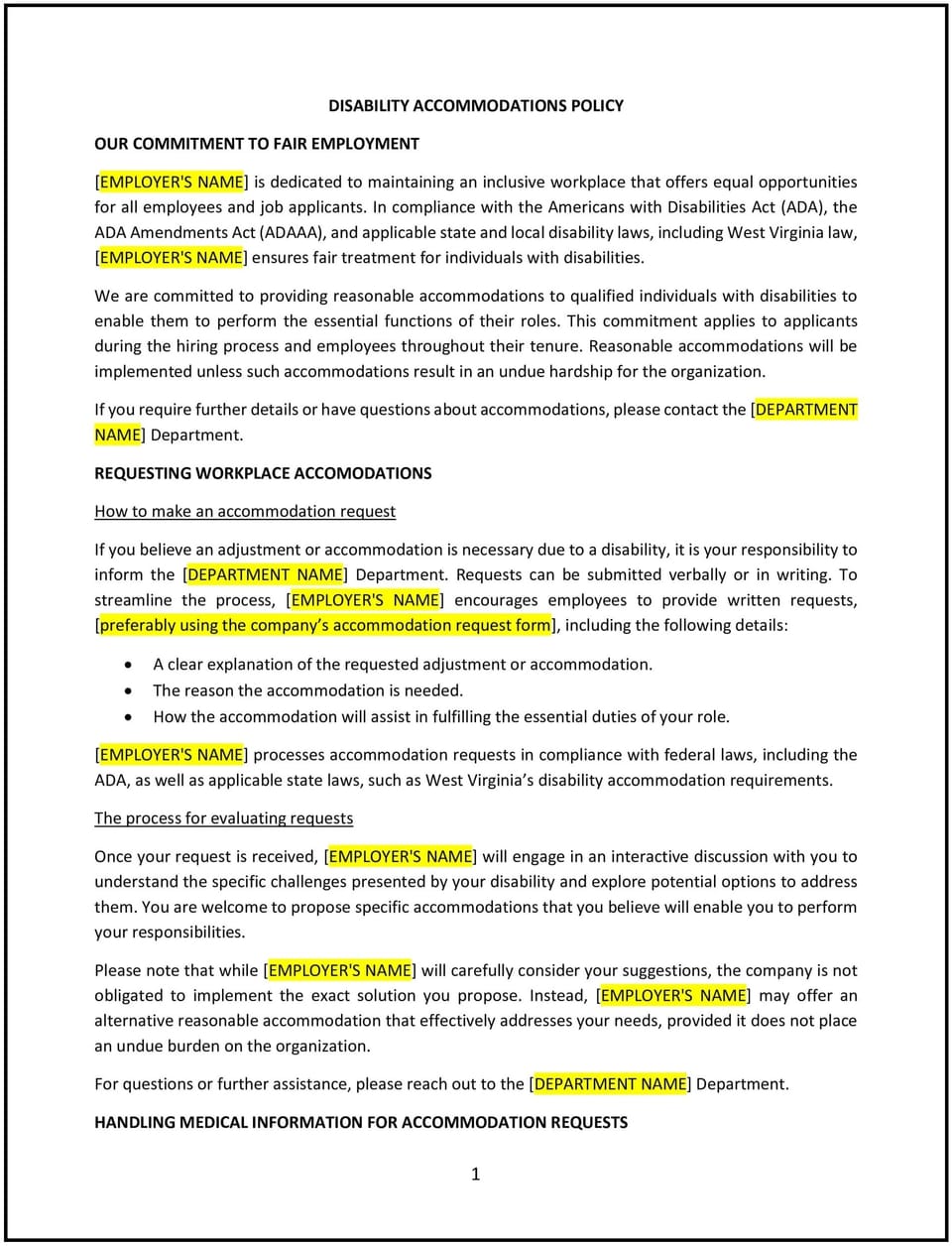Disability accommodations policy (West Virginia): Free template

Disability accommodations policy (West Virginia)
A disability accommodations policy helps West Virginia businesses ensure that employees with disabilities have equal access to employment opportunities and are provided with reasonable accommodations to perform their job duties. This policy outlines the company’s approach to identifying and addressing accommodation needs, enhancing compliance with the Americans with Disabilities Act (ADA) and state laws while fostering an inclusive and accessible workplace.
By implementing this policy, businesses can promote diversity, enhance employee well-being, and meet legal requirements for accommodating employees with disabilities.
How to use this disability accommodations policy (West Virginia)
- Define disabilities: Clearly define what constitutes a disability under the policy, including physical or mental impairments that substantially limit one or more major life activities, in compliance with the ADA and state laws.
- Identify accommodation needs: Establish procedures for employees to request accommodations, including who to contact (e.g., HR, managers), how to submit a request, and what information may be required to assess the accommodation needs.
- Assess requests: Outline how requests for accommodations will be reviewed on a case-by-case basis, taking into account the nature of the disability, the job duties, and the feasibility of providing the accommodation.
- Determine reasonable accommodations: Provide examples of reasonable accommodations that may be offered, such as modified work schedules, assistive technology, physical changes to the workplace, or job restructuring. Specify any limitations if accommodations are deemed unreasonable (e.g., excessive cost, undue hardship).
- Ensure confidentiality: Ensure that information regarding an employee’s disability and accommodation request is kept confidential, with disclosure only to individuals who need to know in order to provide the accommodation.
- Provide an interactive process: Emphasize an interactive dialogue between the employee and the employer to explore potential accommodations and determine the best solution that allows the employee to perform essential job functions.
- Address denial of accommodation: Specify the process for addressing situations where an accommodation request is denied, including options for further discussion, alternative accommodations, or appeal procedures.
Benefits of using this disability accommodations policy (West Virginia)
This policy offers several benefits for West Virginia businesses:
- Promotes legal compliance: Helps the business comply with the ADA and state laws, reducing the risk of discrimination claims and lawsuits related to disability accommodations.
- Promotes an inclusive workplace: Provides a supportive environment where employees with disabilities can perform their jobs effectively, fostering diversity and inclusion.
- Enhances employee retention: By offering reasonable accommodations, businesses can retain talented employees with disabilities, ensuring they have the tools and support to succeed in their roles.
- Improves workplace morale: Employees are more likely to feel valued and respected when they know their accommodation needs will be addressed fairly and promptly.
- Reduces legal risks: The policy reduces the likelihood of legal challenges related to disability discrimination by ensuring that accommodations are provided in a transparent, consistent manner.
Tips for using this disability accommodations policy (West Virginia)
- Communicate the policy clearly: Ensure all employees are aware of the disability accommodations policy, how to request accommodations, and the process for obtaining necessary support.
- Train employees and managers: Offer training to managers and HR personnel on how to handle accommodation requests respectfully and in compliance with legal requirements.
- Review requests promptly: Ensure that accommodation requests are processed quickly and efficiently, without unnecessary delays, to support employees in performing their duties.
- Maintain confidentiality: Handle all information regarding disabilities and accommodation requests with discretion, ensuring that sensitive data is only shared on a need-to-know basis.
- Review periodically: Regularly review the policy to ensure it remains compliant with changes in West Virginia laws, the ADA, or company practices, and that it continues to meet the needs of employees with disabilities.
Q: Why is a disability accommodations policy important for my business?
A: This policy ensures that employees with disabilities have equal access to employment opportunities and are provided with the accommodations they need to perform their job duties, fostering an inclusive and compliant workplace.
Q: How can employees request accommodations?
A: Employees can request accommodations by contacting HR or their supervisor. The company should outline a clear and accessible process for submitting accommodation requests, including any necessary documentation.
Q: What types of accommodations may be provided?
A: Reasonable accommodations can include modifications to the work environment, changes to work schedules, assistive technology, or job restructuring. The policy should specify examples of accommodations based on the nature of the employee’s disability.
Q: Can an accommodation request be denied?
A: The company may deny an accommodation request if it is deemed unreasonable or if providing it would cause undue hardship. However, the company should engage in an interactive dialogue with the employee to explore alternative solutions.
Q: How often should this policy be reviewed?
A: This policy should be reviewed annually or whenever there are changes in West Virginia laws, federal regulations, or company practices to ensure it remains effective and is compliant.
This article contains general legal information and does not contain legal advice. Cobrief is not a law firm or a substitute for an attorney or law firm. The law is complex and changes often. For legal advice, please ask a lawyer.


